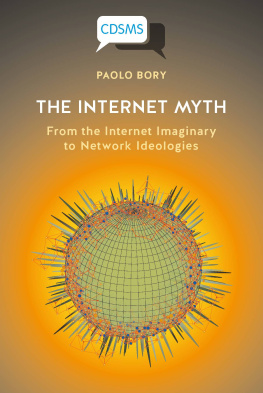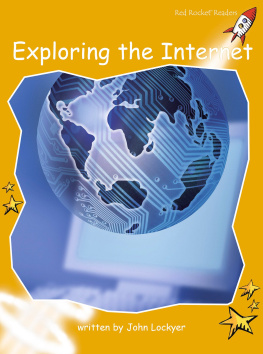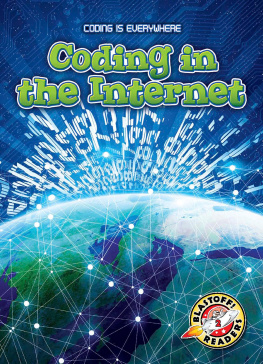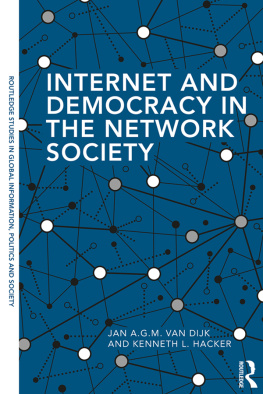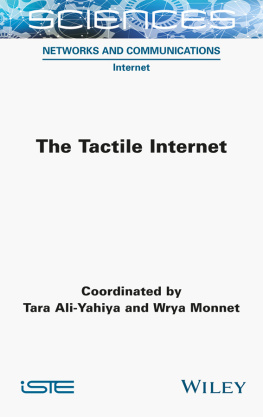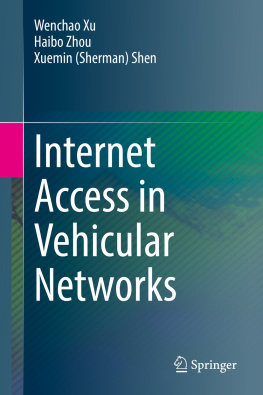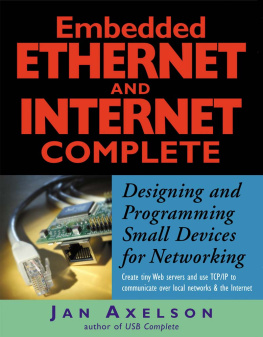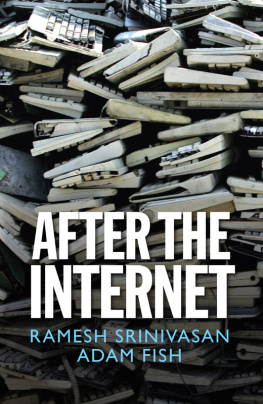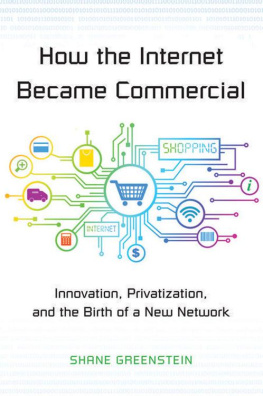Paolo Bory - The Internet Myth: From the Internet Imaginary to Network Ideologies
Here you can read online Paolo Bory - The Internet Myth: From the Internet Imaginary to Network Ideologies full text of the book (entire story) in english for free. Download pdf and epub, get meaning, cover and reviews about this ebook. City: London, year: 2020, publisher: University of Westminster Press, genre: Romance novel. Description of the work, (preface) as well as reviews are available. Best literature library LitArk.com created for fans of good reading and offers a wide selection of genres:
Romance novel
Science fiction
Adventure
Detective
Science
History
Home and family
Prose
Art
Politics
Computer
Non-fiction
Religion
Business
Children
Humor
Choose a favorite category and find really read worthwhile books. Enjoy immersion in the world of imagination, feel the emotions of the characters or learn something new for yourself, make an fascinating discovery.
- Book:The Internet Myth: From the Internet Imaginary to Network Ideologies
- Author:
- Publisher:University of Westminster Press
- Genre:
- Year:2020
- City:London
- Rating:3 / 5
- Favourites:Add to favourites
- Your mark:
- 60
- 1
- 2
- 3
- 4
- 5
The Internet Myth: From the Internet Imaginary to Network Ideologies: summary, description and annotation
We offer to read an annotation, description, summary or preface (depends on what the author of the book "The Internet Myth: From the Internet Imaginary to Network Ideologies" wrote himself). If you haven't found the necessary information about the book — write in the comments, we will try to find it.
Paolo Bory: author's other books
Who wrote The Internet Myth: From the Internet Imaginary to Network Ideologies? Find out the surname, the name of the author of the book and a list of all author's works by series.
The Internet Myth: From the Internet Imaginary to Network Ideologies — read online for free the complete book (whole text) full work
Below is the text of the book, divided by pages. System saving the place of the last page read, allows you to conveniently read the book "The Internet Myth: From the Internet Imaginary to Network Ideologies" online for free, without having to search again every time where you left off. Put a bookmark, and you can go to the page where you finished reading at any time.
Font size:
Interval:
Bookmark:
The Internet Myth:
From the Internet Imaginary to Network Ideologies
Paolo Bory
Critical, Digital and Social Media Studies
Series Editor: Christian Fuchs
The peer-reviewed book series edited by Christian Fuchs publishes books that critically study the role of the internet and digital and social media in society. Titles analyse how power structures, digital capitalism, ideology and social struggles shape and are shaped by digital and social media. They use and develop critical theory discussing the political relevance and implications of studied topics. The series is a theoretical forum for internet and social media research for books using methods and theories that challenge digital positivism; it also seeks to explore digital media ethics grounded in critical social theories and philosophy.
Editorial Board
Thomas Allmer, Mark Andrejevic, Miriyam Aouragh, Charles Brown, Eran Fisher, Peter Goodwin, Jonathan Hardy, Kylie Jarrett, Anastasia Kavada, Maria Michalis, Stefania Milan, Vincent Mosco, Jack Qiu, Jernej Amon Prodnik, Marisol Sandoval, Sebastian Sevignani, Pieter Verdegem
Published
Critical Theory of Communication: New Readings of Lukcs, Adorno, Marcuse, Honneth and Habermas in the Age of the Internet
Christian Fuchs
https://doi.org/10.16997/book1
Knowledge in the Age of Digital Capitalism: An Introduction to Cognitive Materialism
Mariano Zukerfeld
https://doi.org/10.16997/book3
Politicizing Digital Space: Theory, the Internet, and Renewing Democracy
Trevor Garrison Smith
https://doi.org/10.16997/book5
Capital, State, Empire: The New American Way of Digital Warfare
Scott Timcke
https://doi.org/10.16997/book6
The Spectacle 2.0: Reading Debord in the Context of Digital Capitalism
Edited by Marco Briziarelli and Emiliana Armano
https://doi.org/10.16997/book11
The Big Data Agenda: Data Ethics and Critical Data Studies
Annika Richterich
https://doi.org/10.16997/book14
Social Capital Online: Alienation and Accumulation
Kane X. Faucher
https://doi.org/10.16997/book16
The Propaganda Model Today: Filtering Perception and Awareness
Edited by Joan Pedro-Caraana, Daniel Broudy and Jeffery Klaehn
https://doi.org/10.16997/book27
Critical Theory and Authoritarian Populism
Edited by Jeremiah Morelock
https://doi.org/10.16997/book30
Peer to Peer: The Commons Manifesto
Michel Bauwens, Vasilis Kostakis, and Alex Pazaitis
https://doi.org/10.16997/book33
Bubbles and Machines: Gender, Information and Financial Crises
Micky Lee
https://doi.org/10.16997/book34
Cultural Crowdfunding: Platform Capitalism, Labour, and Globalization
Edited by Vincent Rouz
https://doi.org/10.16997/book38
The Condition of Digitality: A Post-Modern Marxism for the Practice of Digital Life
Robert Hassan
https://doi.org/10.16997/book44
Incorporating the Digital Commons: Corporate Involvement in Free and Open Source Software
Benjamin J. Birkinbine
https://doi.org/10.16997/book39
Communication and Capitalism: A Critical Theory
Christian Fuchs
https://doi.org/10.16997/book45
The Internet Myth:
From the Internet Imaginary to Network Ideologies
Paolo Bory

University of Westminster Press
www.uwestminsterpress.co.uk
Published by
University of Westminster Press
115 New Cavendish Street
London W1W 6UW
www.uwestminsterpress.co.uk
Text Paolo Bory 2020
First published 2020
Cover design: www.ketchup-productions.co.uk
Series cover concept: Mina Bach (minabach.co.uk)
Print and digital versions typeset by Siliconchips Services Ltd.
ISBN (Paperback): 978-1-912656-75-2
ISBN (PDF): 978-1-912656-76-9
ISBN (EPUB): 978-1-912656-77-6
ISBN (Kindle): 978-912656-78-3
DOI: https://doi.org/10.16997/book48
This work is licensed under the Creative Commons Attribution-NonCommercial-NoDerivatives 4.0 International License. To view a copy of this license, visit http://creativecommons.org/licenses/by-nc-nd/4.0/ or send a letter to Creative Commons, 444 Castro Street, Suite 900, Mountain View, California, 94041, USA. This license allows for copying and distributing the work, providing author attribution is clearly stated, that you are not using the material for commercial purposes, and that modified versions are not distributed.
The full text of this book has been peer-reviewed to ensure high academic standards. For full review policies, see: http://www.uwestminsterpress.co.uk/site/publish.
Competing interests: The author has no competing interests to declare.
This title has been published with the financial assistance of the
Fondazione Hilda e Felice Vitali, Lugano, Switzerland.
Suggested citation: Bory, Paolo. 2020. The Internet Myth: From the Internet Imaginary to Network Ideologies
London: University of Westminster Press.
DOI: https://doi.org/10.16997/book48 License: CC-BY-NC-ND 4.0
To read the free, open access version of this book online, visit https://doi.org/10.16997/book48 or scan this QR code with your mobile device:

The Author and Publisher thank the Fondazione Hilda e Felice Vitali, Lugano, Switzerland for supporting the publication of this book.
This work is the result of five years of research and fruitful collaboration with my colleagues from the Universit della Svizzera italiana (USI) of Lugano. The realization of this book could not be possible without the support of Gabriele Balbi, who provided me with his advice and motivation. Together, we had a constant and fruitful exchange of ideas and thoughts, and I owe him also for always having much more confidence in my abilities than I had myself. Professors Vincent Mosco and Peppino Ortoleva have been also essential for my academic path; their feedback on previous versions of this book contributed to enrich and enlarge my perspective on network histories, myths and imaginaries. A great thank you goes to my colleagues and friends from the Institute of Media and Journalism of USI: Eleonora Benecchi, Marco Cucco, Gloria Dagnino, Philip Di Salvo, Maria Rikitianskaia, Gianluigi Negro and Zhan Zhang. I am also grateful to Valrie Schafer, for her constant help, kindness and essential support during my research stay in Paris. Thanks also to my Parisian friends Stefano Crabu, Dominique Trudel and Antonio Rafele for sharing such good ideas, and such a good time, together. The theoretical framework of this work owes a lot to Simone Natale, who inspired me with his previous work and original ideas. A big thanks goes to all the interviewees for kindly agreeing to talk to me and sharing their experiences and memories. I am grateful to Roberto Parodi for giving me access to the Telecom Italia world and for being so kind and helpful with the retrieval of informants and sources. I owe all the archivists and librarians from the Archivio Storico Telecom Italia, Polo Bibliotecario Parlamentare, Biblioteca Universitaria di Lugano and CERN Archive for their patience and professional help during these years of research. I would like to thank Andrew Lockett, who supported me during all stages of the editorial work on this publication. I am grateful to Prof. Giuseppe Richeri, Theo Musli and Rocco Bonzanigo from the Fondazione Vitali for their financial and human support for this project. For the rest, the list of people who directly or indirectly contributed to this book would be much too long. I hope that the network of friends and colleagues who have enriched my academic and social life with their writings, thoughts and a long series of empty glasses will recognize themselves in the following pages. If not, the fault is all mine (or of Omar, my sleepless newborn).
Font size:
Interval:
Bookmark:
Similar books «The Internet Myth: From the Internet Imaginary to Network Ideologies»
Look at similar books to The Internet Myth: From the Internet Imaginary to Network Ideologies. We have selected literature similar in name and meaning in the hope of providing readers with more options to find new, interesting, not yet read works.
Discussion, reviews of the book The Internet Myth: From the Internet Imaginary to Network Ideologies and just readers' own opinions. Leave your comments, write what you think about the work, its meaning or the main characters. Specify what exactly you liked and what you didn't like, and why you think so.

